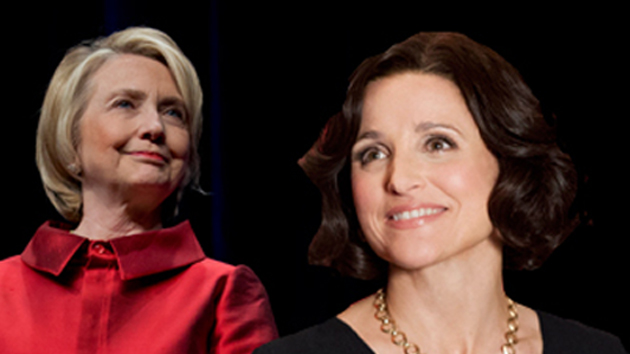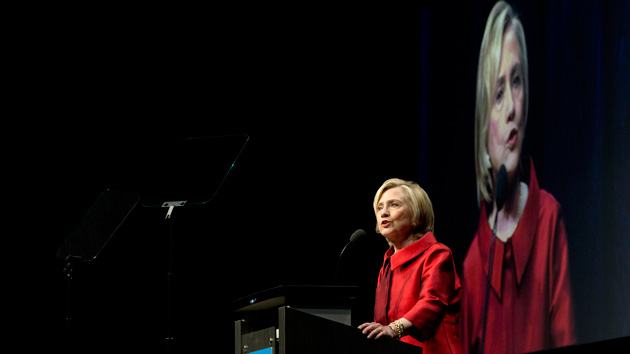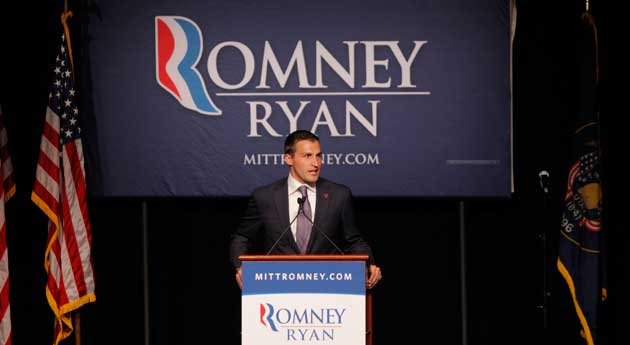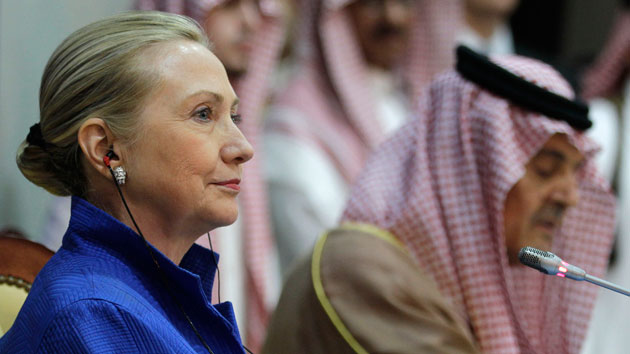
Hillary Clinton: Manuel Balce Ceneta/AP; Selina Meyer: HBO
This week, the State Department released a large batch of the emails that Hillary Clinton sent and received (on her personal account via a private server!) when she was secretary of state. The media, naturally, dove into this pool and quickly found the most amusing items among the 3,096 pages. One day, Clinton had heard about a Cabinet meeting on the radio and asked her aides, “Can I go?” Another time, she emailed the protocol chief at State, “Can you contact your protocol friend in China and ask him if I could get photos of the carpets of the rooms I met in w POTUS during the recent trip? I loved the designs.” She once struggled to get a fax machine to work. Her emails showed how she and her lieutenants assiduously worked the press to get positive coverage. They revealed interesting details of her close relationship with author and political operative Sidney Blumenthal. But overall, this trove of emails—the first of several to come—depicts Clinton as an earnest public servant toiling away on important affairs of state (global food security, Afghanistan policy, climate change, and international women’s rights) while often operating in a Veep-like world, as in the HBO comedy in which Julia Louis-Dreyfuss plays a vice president-turned-president who must contend with absurdities and indignities large and small as she handles the gravest of matters.
These emails chronicle several scenes that could appear in the television show. At least, it would be easy to envision President (or Vice President) Selina Meyer in these situations.
* On December 17, 2009, Clinton zapped senior aide Jake Sullivan an email titled “Argentina.” She noted, “The FM [foreign minister] just told me that Arturo…had insulted their country. He was very upset and said I needed to do damage control. Can you figure out what he’s talking about?” (She might have been referring to Arturo Valenzuela, then the assistant secretary of state for Western Hemisphere affairs.) Within two minutes, Sullivan replied, “On it.” And Clinton responded, “He’s standing right inside the door here.” In other words, it’s awkward; hurry. Imagine Meyer stuck like this: The Argentine foreign minister is waiting for me, I told him I had to go to the bathroom, but now I have to tell him something about Arturo.
* A big part of the secretary of state’s job is calling people: foreign officials, US officials, lawmakers, and policy advocates. Clinton’s emails often refer to her call list for the day. Apparently, this was not a favorite task of hers. On November 26, 2009, her close aide Huma Abedin sent her a call sheet indicating that that morning she had 11 calls scheduled from 8:30 to 11:00 a.m. with the foreign ministers of Japan, France, Poland, Canada, Brazil, Romania, Norway, Italy, Saudi Arabia, the Netherlands, and Spain. “Can’t wait,” Clinton replied. “You know how much I love making calls.”
* One day Clinton showed up for a meeting at the White House only to find it had been canceled—and no one had told her. She emailed her aides, “I arrived for the 10:15 mtg and was told there was no mtg. Matt said they had ‘released’ the time. This is the second time this has happened. What’s up??”
* It can be tough to keep track of all the government and diplo-speak gobbledygook. In an April 2009 email to Sullivan about testimony she would deliver to Congress, Clinton asked, “What is the E3+3 vs the P5+1?” She was referring to diplomatic designations for the group of nations negotiating with Iran about its nuclear program. “P5+1” meant the five permanent members of the UN Security Council (the United States, China, Russia, France, and the United Kingdom) plus Germany. The “E3+3” meant the three EU members plus the United States, China, and Russia. Sullivan explained, “They are identical, just different names.” Clinton followed up: “Why don’t we keep using P5+1?” And Sullivan replied, “I’m being told—and still trying to verify—that as of last week, we’ve succumbed to the Europeans’ preferred term. That there was interagency discussion of this, and that going forward, we will join the rest of the world in calling the P5+1 the E3+3.”
Clinton wouldn’t move on. The thread continued. “What does it mean?” she asked. “What is the E and who are the three?” Sullivan responded, “E is Europe. E3 is UK, France, and Germany. +3 is US, China, Russia. So’s it the same 6 as P5+1, just a different name.” To which Clinton replied, “I already feel safer.” She added, “I feel ashamed that I had to subject you to this.”
* Clinton knew the value of spin. In 2009, she was privately pushing for President Barack Obama to nominate Goodwin Liu, a young and rising star in liberal legal circles, to a spot on the US court of appeals in the 9th Circuit. And she was trying to rally support for him among two key players: Greg Craig, who was then the White House counsel, and Sen. Dianne Feinstein, a Democrat from California, where this particular court is based. Her staff was drafting talking points for her conversations with Craig and Feinstein. But there was a small problem. Craig was known to be a liberal-minded attorney, and Feinstein was considered more moderate in her political views. So Clinton’s team came up with a solution: two sets of talking points. As Cheryl Mills, a top aide, told the secretary in an email, “The first set is for Sen. Feinstein, which stresses Goodwin’s moderate judgments—she apparently needs reassurance that Goodwin is not too liberal. The other set is for Greg Craig, which stresses Goodwin’s progressive credentials as he likely will find that more appealing.” No emails indicated whether Clinton used the right talking points with each. (Of course, on a TV show, an aide would inadvertently switch them.)
* There was always wheeling and dealing under way. When conservative Senate Republicans blocked the nomination of Tom Shannon, who had served in the George W. Bush administration as assistant secretary of state for Western Hemisphere affairs, to be US ambassador to Brazil, Clinton tracked the State Department’s effort to undo this obstruction. When then-Senator George LeMieux (R-Fla.) lifted the hold, she sent an email to Richard Verma, the State official on the case, and asked, “What took them so long? Did you promise your first born?” Verma replied, “Yes, I sold my soul to George LeMieux today. I am not proud of it.” Clinton retorted, “Does this mean you have to go to Cuba and arrest Castro or just shovel more $ into Little Havana?”
* An obscure senator had to be made happy. So, too, a very small country. In 2009, the island-nation of Palau was one of only two countries (the other was Israel) to join with the United States at the United Nations in voting against a resolution calling for an end to the US embargo of Cuba. After the vote, Clinton was forwarded an email indicating that US foreign aid to Palau was being cut. She quickly emailed her top aides: “As I have said repeatedly, I do not want to see Palau shortchanged. I do not know whether this assessment is accurate, so can I pls get an update and recommendation about [how] to take care of this?”
* Political pals and allies were eager to lend Clinton a helping hand. In April 2009, Sen. Barbara Mikulski (D-Md.) sent Clinton an exceedingly warm and fuzzy email (with lousy syntax):
Best wishes to you and all of the clintons. [Sentence deleted.] All of say a. Hearty. Hello and so proud of what you are doing—-you are missed in the senate and by me. But you sure are needed where you are. I will be @ your. Foreign. Ops. Hearing. Let me know any questions you want me to ask to help get your needs/message across. Loved pictures of you+obama on. The. Lawn. Time for. Spring and the resurrection. As always. Your Pal.
* Her political donors were always buzzing about. On December 10, 2009, Brian Greenspun, the editor of publisher of the Las Vegas Sun and a top fundraiser for Clinton during the 2008 presidential campaign, sent her an interesting note: “I trust I am not violating a protocol, but word has it that the israeli ambassador has been trying to meet with you to no avail. I wanted to make sure you knew that was a belief being shared. I can’t imagine why your folks would want to keep you two apart. I hear he is solid. So, that’s the heads up. I am always available if there is a problem with which I can be helpful.” The email collection doesn’t include a response to Greenspun.
* Clinton could be rather sensitive about her treatment by the media. After a Washington Post editorial panned a speech she gave on human rights, she wrote a note to several aides: “I thought the argument they made yesterday about the human rights speech was either deliberately obtuse or clueless. Either way, we need to respond and refute. Can you have a response drafted and sent to me? Also, I’d like to see a summary of points made by other commentary. Thnx.” Within a day, Michael Posner, the assistant secretary of state for human rights, had drafted a reply to the editorial, and it was sent to Clinton for review. “That’s fine,” she wrote in an email to several aides. “Will it be printed in next day or so?” And when Joe Klein wrote a profile of Clinton for Time, her press aide Philippe Reines sent her the magazine cover featuring her which he called “gorgeous.” She replied, “How does the article compare to the cover???”
* Fashion mattered. When Clinton visited Afghanistan in November 2008, State Department spokesman PJ Crowley sent her an email with the title, “Love the Coat.” It read, “Your arrival in Kabul landed the front page picture in the NYT and sparked an on-line poll in Huff Post about your coat. At last check, its favorability rating was 77 percent.” Clinton answered, “Thnx. I bought the coat in Kabul in 03 and thought it should get a chance to go home for a visit!”
The emails depict Clinton consistently engaged in consequential, deliberative, and thoughtful diplomacy on in-the-news controversies and quieter fronts. When she gave a speech in Guatemala, she mentioned the name of a Guatemalan activist because she was told, as she put it in an email, that doing so “might literally save her life.” She and her aides oversaw an effort to pressure the Uganda president to weaken a proposed bill that would criminalize homosexual activity and subject gays and lesbians to the death penalty. (The president told the US ambassador he would work with legislators to revise the measure—a slightly weaker version of which did later become law before being invalidated by the top court in Uganda.) And she wanted to use her position to help a young Yemeni woman named Nujood Ali. In August 2009, she sent this email to a senior department aide: “Do you recall Noori Ali (?), the ten year old Yemeni girl who got herself divorced? I met her at the Glamour awards last year. There was a CNN story last few days about how unhappy she is, still living at home, not attending school and quite angry that her life is not better. Is there any way we can help her? Could we get her to the US for counseling and education?”
Ultimately, these emails display a hardworking secretary juggling many issues while trekking the world and frequently responding to challenges with a sharp and sarcastic sense of humor. But they indicate that government work can be arduous and, at times, silly and surreal. No doubt, Clinton and Selina Meyer would have much to discuss and share, should they ever meet or email.
















